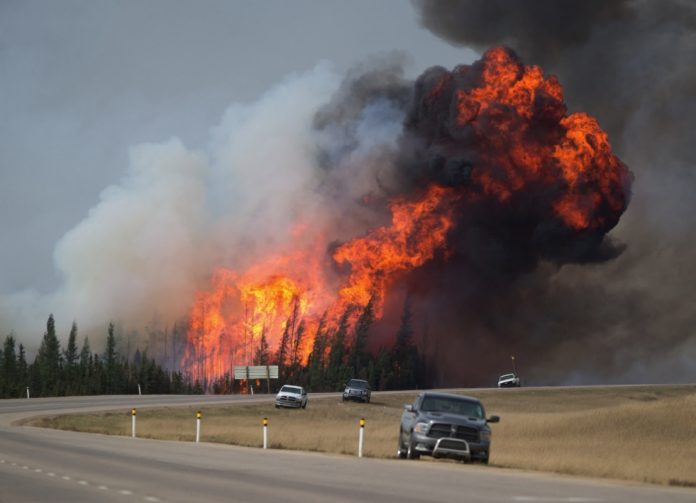
Wildfires raging through Alberta have spread to the main oil-sands facilities north of Fort McMurray, knocking out an estimated 1 million barrels of production from Canada’s energy hub. Fire officials say the out-of-control inferno may keep burning for months without significant rainfall.
The blaze, forecast to expand to more than 965 square miles (2,500 square kilometers) in the next few days, made an “unexpected” move to the north Saturday, rapidly encroaching bitumen mining operations run by Suncor Energy Inc. and Syncrude Canada Ltd. The fires may soon cover an area the size of Luxembourg.
“It is a dangerous and unpredictable and vicious fire that is feeding off an extremely dry Boreal forest,” federal Public Safety Minister Ralph Goodale told reporters Saturday in Regina, Saskatchewan. He said the swirling fire is not yet a threat to any additional communities.
The wildfires have led to combined production cuts equal to about 40 percent of the region’s output of 2.5 million barrels, based on IHS Energy estimates. The cuts, and the mass exodus of more than 80,000 people from the fires raging in Fort McMurray, represent another blow to an economy already mired in recession from the oil price collapse.
Syncrude, a joint venture controlled by Suncor, shut down its Aurora mine and Mildred Lake operation about 40 kilometers north of the city and has evacuated about 1,200 workers. Syncrude has a capacity of 350,000 barrels of oil a day. The fires are expected to reach the southern edge of Suncor’s main oil-sands base on Saturday, said Chad Morrison, a wildfire manager for the Alberta government. Morrison said the oil facilities are highly resistant to fire with their buffer zones.
“While there is no immediate threat from fire, smoke did reach our Mildred Lake site this morning,” said Syncrude spokesman Leithan Slade, in an e-mailed statement. “We will bring operations back online only when it is safe to do so.”
There is no damage to any of the Suncor assets or operations in the Fort McMurray region, spokeswoman Nicole Fisher said. The Calgary-based company is using firebreaks, water sprinklers and pumps to protect the facilities, she said.
Suncor, Canada’s biggest energy company, Phillips 66 and Statoil have declared force majeure on supplies from the region. Husky Energy said Saturday it was shutting down its Sunrise facility, which has a capacity of 60,000 barrels a day and was producing about half that.
The fire reached Cnooc Ltd.’s Nexen operation to the south of the city, forcing a shutdown of that facility, which has a capacity of 92,000 barrels. Officials haven’t been able to assess if there was damage, due to the clouds of smoke. The facility is “probably OK,” Morrison told reporters Saturday in Edmonton.
Disruptions to oil production, the lifeblood of Alberta’s economy, add to a human catastrophe as blazes razed entire neighborhoods in Fort McMurray, the gateway to the world’s third-largest crude reserves. Police and military officials are working to evacuate the remaining 10,000 residents who had gone north to work camps now considered unsafe, escorting them in convoys of 50 vehicles at a time through the smoke and ash. Alberta Premier Rachel Notley said most of the families who fled to the north camps will be relocated by the end of Saturday.
Sam Osterhagen, a welder who was working near the oil hub, spent the bulk of his 40th birthday in the convoy after lining up early in the morning. He and his coworkers were stuck for the last three nights at a campsite, watching as the fires burned. It looked like an orange ball glowing in the distance, with flames a couple hundred feet high, they said.
“I didn’t think I was going to make it,” Osterhagen said, after stopping with his buddies to grab a burger at Wally’s Fast Food in Grasslands on Highway 55, about halfway from Fort McMurray to Edmonton. It had taken them seven hours to drive a distance that would normally take two.

